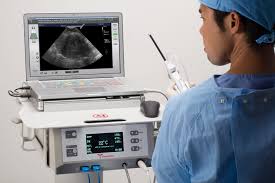Gynesonics®, a women’s healthcare company focused on the development of minimally invasive solutions for symptomatic uterine fibroids, announced today the Food and Drug Administration (FDA) has given clearance of the Sonata® System 2.2 which provides important new benefits for facilities, physicians and patients.
These benefits include: a 20% reduction in the smallest ablation size setting, which greatly increases the ability to treat fibroids in tighter anatomical locations; new software advances that allow the surgeon to control all aspects of the ablation from the handpiece without requiring OR staff to separately adjust settings; and changes that enable the surgeon to adjust all ultrasound settings directly from the sterile field. The system includes a new reusable cable. Additionally, the novel intrauterine ultrasound reusable probe is now validated to be sterilized using the family of STERIS V-PRO® low temperature sterilization systems, commonly available at hospitals.
“This clearance brings significant system improvements that expand the location of fibroids that can be treated while allowing the physician to control all aspects of the treatment from within the sterile field,” said Jiayu Chen, Ph.D. Vice President, Engineering and Advanced Technologies at Gynesonics. “These changes provide real benefit to the treating physicians and to a greater number of women seeking relief from their symptoms caused by fibroids. Additionally, the ability to make use of the widely available STERIS V-PRO family of low temperature sterilization systems, and the notable engineering achievement of the new, reusable RF handpiece cable have cost benefits for the facilities and reduce the procedural waste. This is a positive advance for women, physicians and medical center facilities.”
The Sonata technology platform integrates the first and only commercial intrauterine ultrasound system with a proprietary advanced radiofrequency ablation device, providing an incision-free, uterus-preserving, transcervical treatment for symptomatic uterine fibroids. The Sonata Treatment is a breakthrough alternative to hysterectomy and myomectomy, and can treat a wider range of fibroid types, sizes, and locations than hysteroscopic myomectomy. Fibroids are treated from within the uterus, so treatment with the Sonata System requires no incisions, no tissue is surgically removed, and the uterus is retained.
“Gynesonics has a long and successful history of meaningful innovation, and changes that have real benefits to the healthcare system and to the patient. The new Sonata System 2.2 is a continuation of this commitment to innovation. The positive timing of this clearance coincides with the accelerated demand for Sonata,” said Chris Owens, President and CEO of Gynesonics. “The new system provides greater features, ease-of-use and flexibility to physicians who wish to offer Sonata TFA to their patients and the millions of women who have been waiting for an option that does not require invasive, incisional surgery.”



